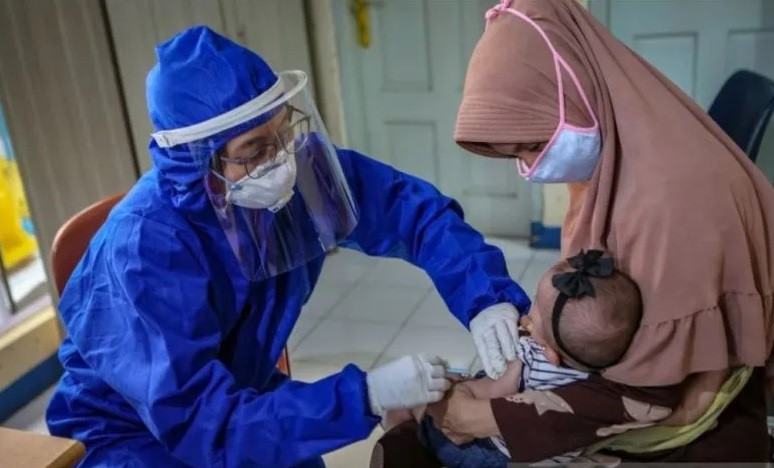Govt kicks off child immunization catch-up campaign
Child vaccination rates have fallen in Java and Bali as a result of the COVID-19 pandemic.
Change Size

T
he government has kicked off a child vaccination campaign in Java and Bali to combat a significant decline in pediatric immunization rates as a result of the pandemic.
National Child Vaccination Month (BIAN) Phase II seeks to provide catch-up vaccinations for children under the age of 5 who have missed their polio vaccines or their diphtheria, whooping cough, tetanus, hepatitis B, pneumonia and meningitis (DPT-HB-Hib) shots.
Health authorities are also aiming to administer some 9.4 million measles and rubella vaccine doses to children on the two islands.
The Health Ministry will work with schools, hospitals, private clinics, integrated health services posts (posyandu) and community health centers (puskesmas) in Java and Bali during the campaign, which is set to run until the end of the month.
The ministry will also set up mobile puskesmas in remote areas to support the campaign.
The government conducted the first phase of BIAN from May to July, targeting some 27 million children in Sumatra, Kalimantan, Sulawesi, Nusa Tenggara, Maluku and Papua.
At the launch of the campaign on Wednesday, Health Minister Budi Gunadi Sadikin urged parents to get their children vaccinated, noting that immunization was a safe, cheap and effective measure to protect them from various diseases.
"It's my job as health minister to keep the public healthy through curative and preventive efforts. Vaccination is a preventative measure, so don't forget to get your children vaccinated to keep them healthy," Budi said in Karawang, West Java.
Immunization backsliding
The World Health Organization and UNICEF recently published a report suggesting that the COVID-19 pandemic had fueled the largest sustained decline in global childhood vaccinations in approximately 30 years.
The report found that the share of children who had received three doses of the diphtheria, tetanus and pertussis (DTP3) vaccine – a marker for immunization coverage within and across countries – fell 5 percentage points from 2019 to 2021 to 81 percent.
As a result, 25 million children missed out on one or more doses of DTP vaccine through routine immunization services in 2021 alone, 2 million more than those who missed out in 2020 and 6 million more than in 2019.
Indonesia, India, Nigeria, Ethiopia and the Philippines recorded the highest number of children who did not receive a single dose of the DTP vaccine during the two years of the COVID-19 pandemic.
According to Health Ministry data, the coverage rate for DTP-HB-Hib vaccination in Indonesia dropped from 96.5 percent to 79.7 percent from 2019 to 2021. Meanwhile, overall basic immunization coverage in the country dropped by roughly 9.5 percent during the course of the pandemic – from 93.7 percent in 2019 to 84.2 percent in 2021.
More than 1.7 million children across the archipelago did not receive a single vaccine between 2019 and 2021, the data shows.
Outbreak of preventable diseases
A 2021 UNICEF study found that the pandemic had caused significant disruptions to primary health care in Indonesia – with three in four households with children reporting challenges in accessing healthcare services, one in four reporting problems in seeking treatment for sick children and one in ten unable to access immunizations.
UNICEF acting country representative Robert Gass said the major decline in routine immunizations in Indonesia had left millions of children "in a precarious health situation" and that catch-up immunizations were urgently needed as the country recovered from the impacts of the pandemic.
The decline in childhood vaccinations has led to several outbreaks of vaccine-preventable diseases in some provinces, the government has said, including diphtheria, measles and rubella, leading to a double public health burden.
The Health Ministry recorded 153 diphtheria cases nationwide between January and November of last year, as well as 367 cases of measles and 271 of rubella so far this year. However, there is no data available for previous years.
Earlier this year, the ministry introduced three new vaccines to the national childhood immunization program, bringing the total number of basic vaccinations to 14.
The three additions are the HPV vaccine, which can help prevent cervical cancer, the second most common type of cancer in Indonesian women, the pneumococcal conjugate vaccine (PCV) for pneumococcal diseases, such as pneumonia and sinus infections, and a rotavirus vaccine for infectious diarrhea.
The PCV and rotavirus vaccines are intended to prevent chronic diarrhea and pneumonia – two key contributors to long-term nutritional deficiency complications, such as stunting and malnutrition.









